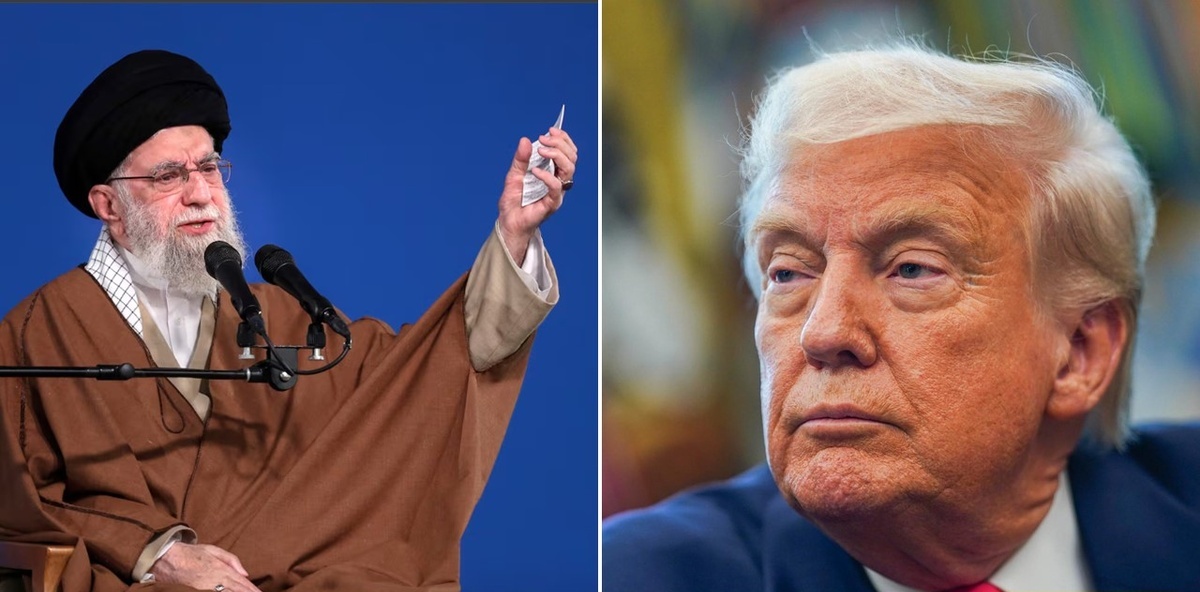SAEDNEWS: Supreme Leader Ayatollah Ali Khamenei declared that Iran will not negotiate directly with the United States over its nuclear programme, calling Washington’s approach “a sheer dead end,” as European powers push for sanctions enforcement.

On the sidelines of the United Nations General Assembly, Iran’s Supreme Leader Ayatollah Ali Khamenei stated firmly that Tehran will not engage in direct negotiations with the United States regarding its nuclear programme.
In a televised address, Khamenei said:
“The US has announced the result of the talks in advance. The result is the closure of nuclear activities and enrichment. This is not a negotiation. It is a diktat, an imposition.”
These remarks followed meetings by Iranian Foreign Minister Abbas Araghchi with diplomats from Germany, France, and the UK (the E3), as well as EU foreign policy chief Kaja Kallas, discussing the reimposition of sanctions set to take effect in just days.
Negotiations with the US have long been the sticking point in nuclear discussions. US President Donald Trump, in his UN speech, labelled Iran the “world’s number one sponsor of terror” and vowed that Iran would “never possess a nuclear weapon.”
Khamenei, however, rejected all attempts at dialogue, insisting that any direct talks with Washington would be fruitless:
“The outcome will always be dictated by them. There is no genuine negotiation, only imposition and diktat.”
This statement comes just days after the UN Security Council rejected a resolution to extend sanctions relief for Iran, a decision Tehran denounced as “politically biased.”
The E3 countries (Germany, France, UK) accuse Tehran of breaching nuclear commitments, including building a uranium stockpile exceeding 40 times the limit set in the 2015 nuclear deal, from which Trump unilaterally withdrew in 2018.
European powers have indicated willingness to extend deadlines if Iran:
Resumes direct talks with the US
Allows IAEA inspectors access to nuclear sites
Accounts for the over 400 kg of highly enriched uranium monitored by the UN
Tuesday’s meetings appear to have produced little advancement. German Foreign Minister Johann Wadephul said the talks “didn’t go particularly well.”
EU foreign policy chief Kaja Kallas stressed that the European negotiating team needs to see “some real action” from Tehran to prevent sanctions.
“Diplomacy has a chance. Deadlines are running, and let’s see. We need to see some real action on the Iranian side as well,” she added.
Iran has repeatedly denied pursuing nuclear weapons but maintains its right to peaceful nuclear energy. Khamenei’s speech reaffirmed this doctrine: Iran does not want nuclear weapons, but it will not bow to international pressure, Al Jazeera’s Tohid Assadi reported from Tehran.
Tensions rose in June when Israel waged a 12-day war on Iran, targeting nuclear facilities with US support. These strikes occurred a day after the IAEA board determined Iran had not fully complied with international safeguards.
The UNSC recently voted against permanently lifting economic sanctions, dealing a severe blow to Tehran’s economy. This followed a 30-day process initiated by the E3 to reinstate sanctions unless Iran met their demands.
Hardline Iranian lawmakers have called for resuming nuclear weapons development, citing concerns that renewed sanctions could spark war with Israel.
If no diplomatic solution emerges this week, sanctions will automatically snap back on Saturday evening, freezing Iranian assets abroad, halting arms deals, and restricting ballistic missile development, among other measures.
Despite the tense standoff, IAEA chief Rafael Grossi announced that a team of inspectors is en route to Iran, leaving the door open for a deal that could prevent the resumption of sanctions:
“Everything is possible. Where there is a will, there is a way. We have inspectors on the way, and there is a possibility to start work depending on Iran’s political will.”
Khamenei’s refusal to negotiate directly with Washington places the world at a critical juncture. The deadlock increases tensions and complicates any potential future nuclear agreement.
With sanctions looming and regional instability rising, the international community watches closely. Any misstep could trigger a nuclear crisis or regional escalation.
As Kallas summarized:
“Diplomacy has a chance, but the clock is ticking. Real action from Iran is crucial.”
In short, the world is on edge, waiting to see if Iran will compromise or double down on its nuclear ambitions.

